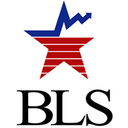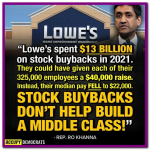Come on now.
a) the first sentence you cannot prove.
And b) I could care less if people are 'citing' the NBER number.
Thus it means little to nothing.
Most people call a recession two consecutive quarters of negative GDP growth.
No...I cannot prove it.
But it is common knowledge.
And - once again - the U-3 is a JOKE.
You could have one person working in America. Just one. And if 250 million Americans all wanted jobs, were ready to take a job but had given up looking for a job because there literally were none available?
In the U-3's eyes...the unemployment rate would be 0.0%.
That is RIDICULOUS.
The U-3 is a joke.
And it has been a joke since 1994.
Anyone who uses it in ANY WAY to determine a recession is using highly-flawed data.
And thus, are a waste of time, imo, in that regard.
Now unless you have a link that is unbiased and proves that most of Main Street and Wall Street use the goofy, NBER method rather than the traditional one to determine a recession...we are done here.
Good day.
I suppose I cannot prove it in the sense of providing your a comprehensive list of the positions of every such person. What I can do, though, is suggest you read about recessions online. Pretty much regardless of source, you'll see great consistency (among professionals of various sorts, at least) about what the dates of various recent recessions were, and it's pretty much always the NBER dates they're using. It may be a private organization, but for practical purposes, it's broadly treated as an official determination.
Again, Google it yourself if you don't believe me. Try to find ANY link online that gives a specific start date to the Great Recession that DOESN'T say December 2007. Obviously, the quarter doesn't start in December, so all those references to December cannot be referencing the old-fashioned "two consecutive quarters" definition. They're referencing the NBER, explicitly or not.
As for the two-consecutive-quarters definition, that's certainly one you hear occasionally from amateurs, since it was the common definition many decades ago. But, it definitely hasn't been a standard definition used by economists and other pros for a long time.
For example, how many recessions have we had since 1950? If you define it as "two consecutive quarters of negative GDP growth" the answer is: only 4. We had two of them under Eisenhower, one under Bush, and one under Trump. Using that definition, the last time a recession started during a Democratic presidency was way back in 1949!
Even if you tweak that to refer to two consecutive quarters of negative growth of
real GDP, that erases some widely-acknowledged recessions. Like in 2001 the economy shrank in first and third quarter, and it's widely acknowledged to be a recession, but there was growth in second quarter, so it doesn't fit the consecutive quarter requirement. Using that definition also erases the 1960 recession (-2.2%, +2.0%, -5.2%).
Anyway, I understand that because a Democrat is president, you are currently committed to the notion that U-3 is a joke. Fine. Use U-6 then. As mentioned, that's down even more sharply on Biden's watch, and is down so far in 2022, too, so there's not yet a sign of a recession in that indicator. Or use the PAYEMS establishment survey, which shows month after month of job creation that is far above average, and vastly above what's needed to provide enough jobs to cover the expansion of the labor force. If labor market weakness is an element of a recession, we don't see that yet. Maybe it's about to show -- the Fed certainly has committed hard to the political cause of cratering the economy before the election. But, so far, they haven't succeeded.


